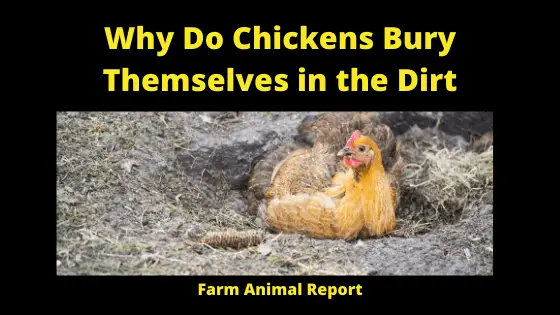As a general rule Chickens love dust baths. The dirt bathing process helps them to get clean and rid themselves of the parasites that tend to afflict them (mites, fleas, etc.) because instinct has taught them that the dust clogs the breathing pores of the parasites, and kills them off. Dust bathing is also a relaxing and even social catch your flock bathing together-squirming and flapping around with glee.
Why Do Chickens Roll Themselves in the Dirt? The chickens find some warm, dry, loose material like dirt, sand, or much; and proceed to dig themselves in. They will dig and dig, throwing dirt all over themselves, and make happy noises while doing it. Why Do Chickens Roll in the Dirt
You will like to watch while your chickens will bury themselves beneath the window with a bench seat, and you will enjoy while sitting there watching and listening to them.
Check Out Amazon for Educational Resources for Breeding Chickens
Why Do Chickens Roll in the Dirt/ Dust Baths
- Chickens take dust baths to get clean and rid themselves of the parasites that tend to afflict them (mites, fleas, etc.) because instinct has taught them that the dust clogs the breathing pores of the parasites, and kills them off.
- They will find a suitable warm spot, close their eyes, and roll or dig until they have dusted down to their skin. When they are all done, stand back because they will shake out a considerable amount of dust and dirt.
- Dust bathing is the chicken’s way of keeping themselves clean (just like you would bathe a dog, or shower yourselves), it just happens to be a more distinct, and quite frankly, odd way of doing so.
- Dust bathing is also a relaxing and even social catch your flock bathing together-squirming and flapping around with glee.
What Kind of Bathing Facilities Will do You Provide to your Chickens for Spa Time?
Why Do Chickens Bury Themselves in the Dirt – If your chickens are confined to a coop, or their run is all luscious grass and minimal dust, you will need to provide your girls with an adequate space where they can happily dust bath. Make sure you choose a nice dry and sunny spot. Your girls prefer to perform this activity in the sun, especially in winter. There are several materials besides dust and dirt that you can add to the dust bathing area to make it a little more enticing for your girls
12 Ways to Make Money by Chicken Farming—Extensive Guidelines for Chicken Farmers
Wood Ash:
This is a very welcome addition to your dust bath, although be sure only to use wood fireplace ash- not wood that may have had lighter fluid or other chemicals come in contact with it. Not only does it add some extra loose material to the dust bath, but charcoal wood ash actually contains vitamin K, calcium and magnesium, and absorbs toxins, so will provide medicinal benefits for your girls. So don’t be alarmed if your girls nibble and peck at it as they bath-it will do them a world of good!
Diatomaceous Earth (Food Grade):
While some backyard chickens keepers refrain from using diatomaceous earth (DE) due to believed possible health risks for humans, it’s the ability to kill mites, lice, fleas, ticks, and other parasites make it a great additive to your dust bath-especially if your flock is struggling with a parasite problem. It is important to be cautious when handling DE, as it can become a lung irritant if inhaled, so be sure to wear a mask when applying it to the dust bath area.
Sand:
Fine sand is the number one dust bath ingredient! It is great for cleaning feathers and also assists with killing parasites such as mites, lice, and fleas. Your hen will love squirming about among its grainy texture-relishing all its goodness!
Herbs:
Several herbs are beneficial to your chicken’s health, so dried herbs sprinkled in their dust bath area can help to harness these health benefits. Dried lavender, rosemary, and mint are all-natural insecticides, so will help to prevent pesky parasites. Thyme and rosemary are great anti-inflammatories so they will promote a healthy respiratory system.
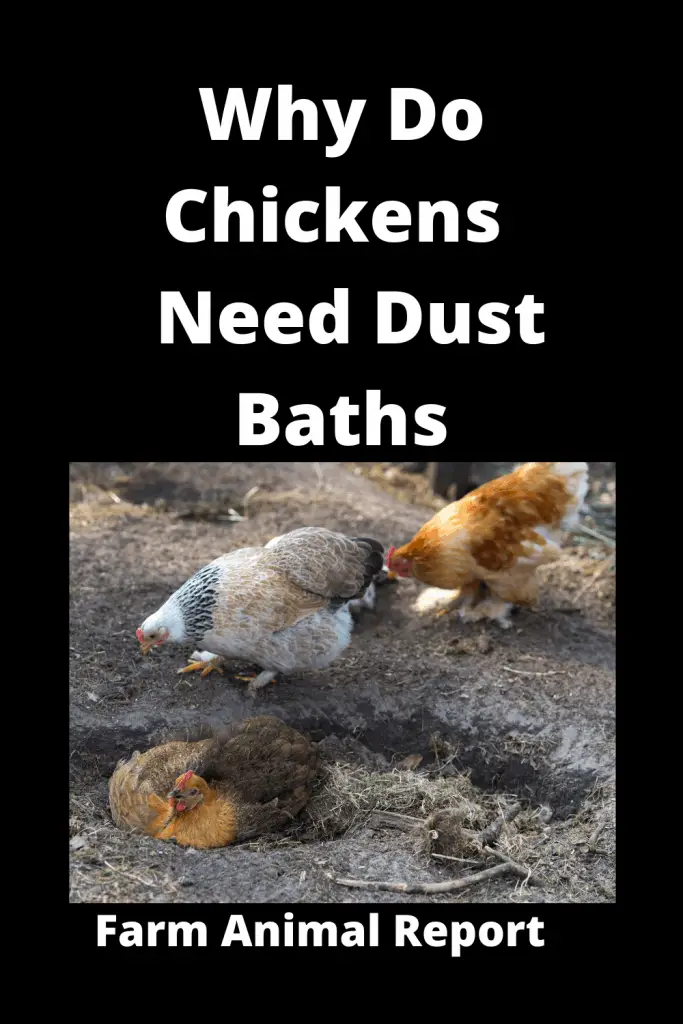
Hay and straw:
Hay and straw are often the most popular bedding. It’s soft and springy which gives your chickens something soft to walk on and sleep in. It also smells good, which is nice in a chicken coop.
Pine shavings:
Pine shavings are also a popular choice. It dries quickly, takes a while to break down, and is fairly inexpensive. You can usually find bags of it at pet stores or garden supply stores.
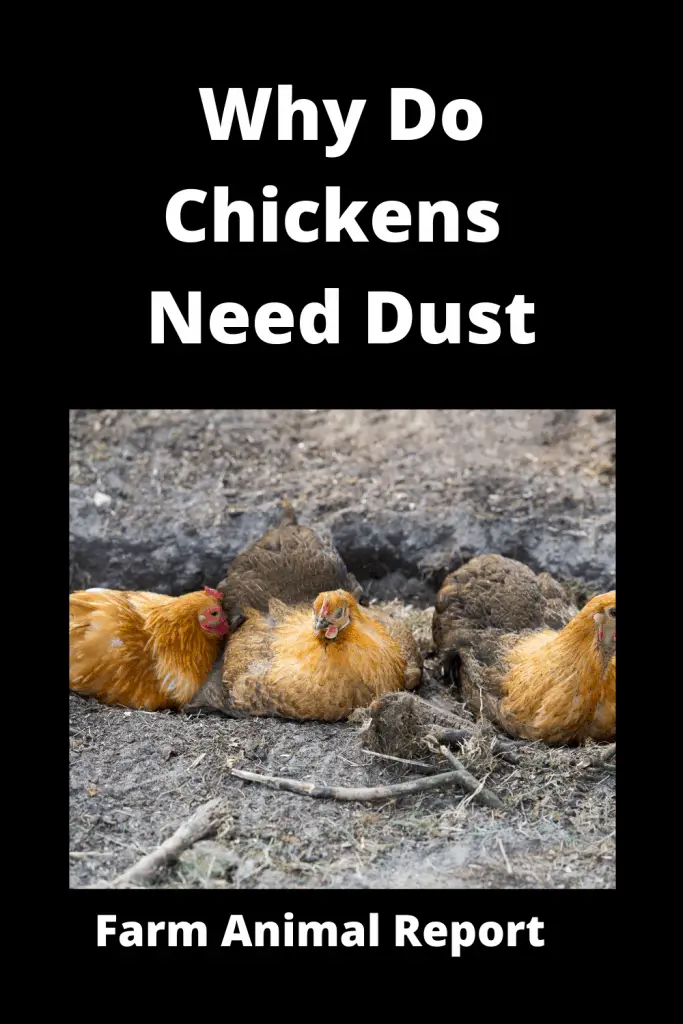
Fresh-cut grass:
Fresh cut grass free of pesticides or other chemicals, finely shredded leaves, and even shredded paper. If you use shredded paper, don’t use glossy paper, and make sure there isn’t a lot of ink. The ink can be toxic to chickens in large quantities.
Despite how much effort you put in your girls, they will choose to bathe where they want to, not always where you want them to, especially if they are in a free-range environment. So be prepared to have them shun the delightful bath you spent so long lovingly preparing!
How Can You Maintain the Dust Bath for Your Chickens?
If you have set up a specific dust bathing area for your flock, you need to make sure that the area is maintained so it can serve its purpose of keeping your girls squeaky clean! Clean out bird droppings regularly, and completely refresh the contents every few weeks.
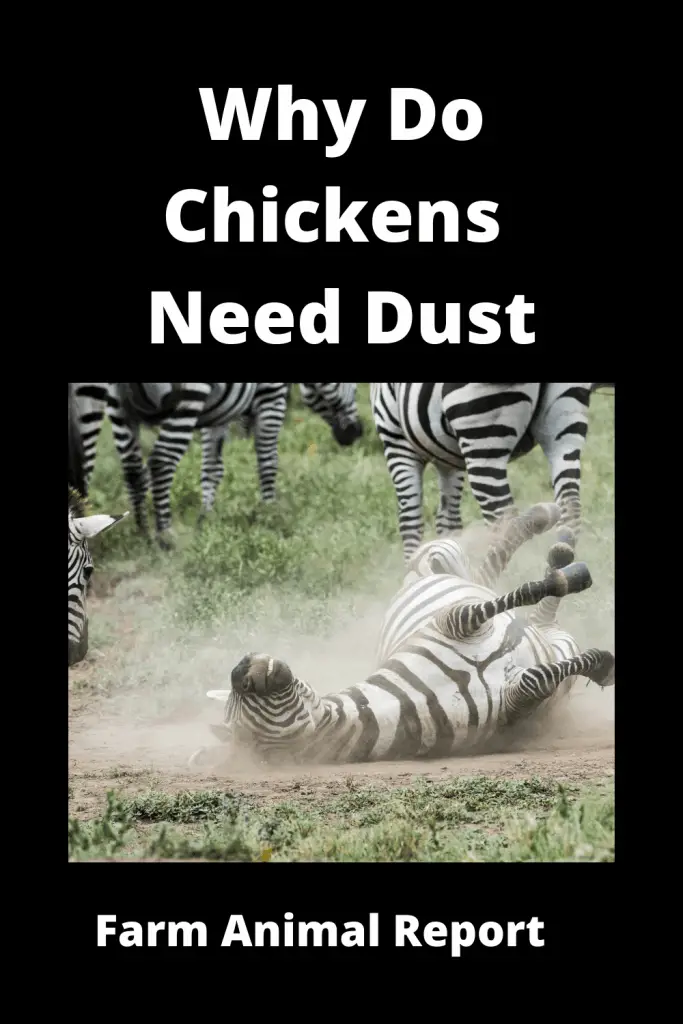
If you want to have super clean, bug-free chickens, provide them with adequate dust bathing facilities!
From dust bathing to diets, make sure that you have got the knowledge you need to raise a happy, healthy flock. Did you know 67% of chicken keepers surveyed experienced a chicken health or behavior issue in the first 12 months that they did not know how to handle?
How to Keep Your Chickens Healthy?
- Make sure you clean their feed and water dishes. You don’t want them to get sick from eating or drinking something they should not.
- Ward off bacteria. Add one or two tablespoons of apple cider vinegar (ACV) to one gallon of their drinking water. This helps keep unhealthy organisms from growing as well as the green slime that appears now and then. It also helps the chickens digest their food and encourages the good bacteria to grow in their digestive system.
- Provide freedom. Chickens love to wander and be free. Give them plenty of space to scratch, run, and play. If your chickens aren’t free-range, provide them with a chicken run if you have room.
- Monitor for the issue: check on your chickens and observe them. Each chicken has a different attitude and personality. If you notice something off, check on them.
- Provide healthy food: make sure you are giving them feed that is right for them. For example, laying hens need a diet higher in calcium than younger hens. When buying feed, keep the hen’s age in mind, you could use starter feed for chicks, grower feed for birds that aren’t quite laying, and feed higher in calcium for hens that are.
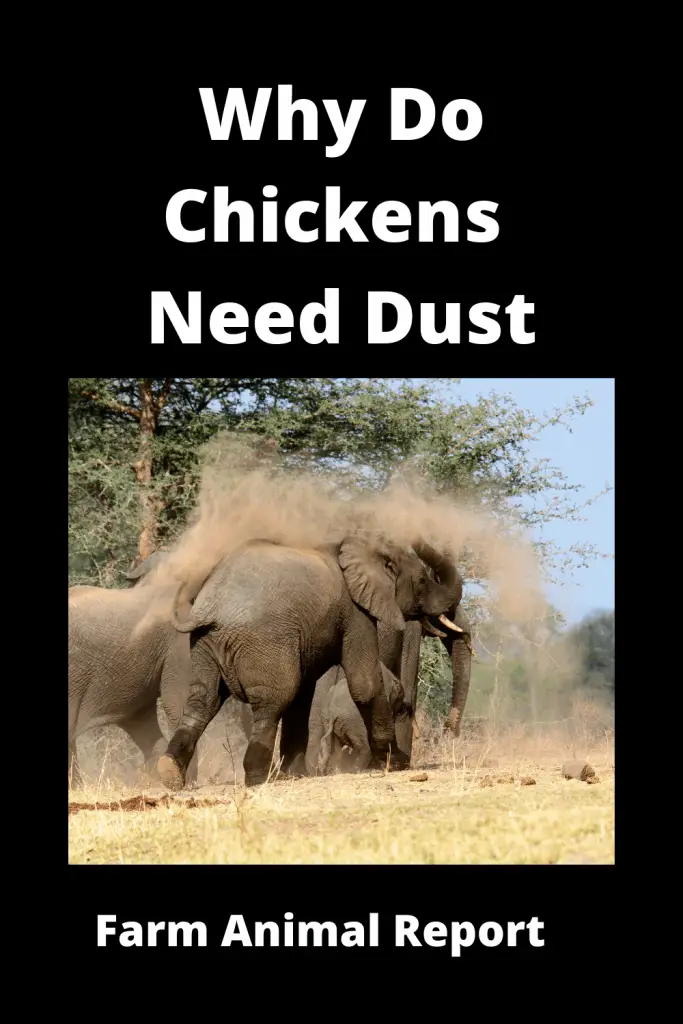
Do Chickens Eat Dirt?
Chickens will eat dirt. In addition to actual dirt, chickens will eat seeds, insects, and worms found in the dirt. Chickens eat dirt and sand to help them with digestion. Chicken has no teeth, and the course dirt helps them to grind up their food. They will also eat small pebbles and rocks for this purpose.
Dirt stays in their gizzards, ready to grind when they eat. This helps them to digest their food better. Eating dirt won’t hurt your chickens. Their stomachs are already built to digest the bugs, germs, worms, and other leftovers found in the dirt.
If your chickens seem to be eating a lot of dirt, and not just the food found in the dirt, they may have a mineral deficiency. Depending on where you live, your soil may be high in certain minerals that your chickens may be naturally speaking out. Check their diets to make sure they are getting enough grains, meat, and other minerals.
Do Chickens Need Water to Bathe in?
Chickens don’t need water baths. They take dust baths to clean themselves. But a water bath won’t hurt them either. If you do give them a bath in water, make sure that the shampoo or soap doesn’t dry out their skin and feathers. Shampoo can cause chicken irritation and other health issues.
Even if you bathe them with water, you will still want to provide a dust bath for them. You may even see your chickens take a dust bath to wash off your water bath!
Why Do Chickens Dig Holes?
The primary reason that a chicken will dig holes is its instinct. Yes, there are benefits for your birds to dig holes take a dust bath, keep cool, have a snug place to lay eggs, etc. but it’s their instinct that drives them to do this.
An instinct to scratch at the ground is completely innate. This is pretty impressive considering that they have to be shown as chicks, this is water, this is food. But somehow, when it comes to scratching, there is no instruction needed. Even with no mama hen around to show them how, you will find chicks barely two days old, scratching at the bedding.
Advantages of Digging Holes:
While it might seem counterproductive for your lawn, there are several reasons why holes in the ground are good for your chickens.
- Keeping cool: sitting low in some nice cool dirt is a great way for your chicken to cool off. And by digging a hole, your bird is allowing more of its body to come in contact with this natural cooling.
- A snug place to lay eggs: laying an egg, is quite a process for your chicken it’s something that takes time, effort, and a place that provides peace. Sitting in a cozy hole can make this strenuous process a little more bearable.
- Yummy roots and bugs: There is a whole world of delicious chicken morsels right under your bird’s feet. And they know it! From tender roots to wriggly worms, with just a little bit of digging, it’s all there for the taking.
Disadvantages of Digging Holes:
For chickens, digging holes is just a natural way of life. For anyone who likes professional-looking landscaping (or even just a flat lawn), chickens digging holes can be the bane of your existence. Here are a few of the unpleasant side effects of a chicken’s busy feet.
Woodchips: kicking woodchips for a chicken is like trick-or-treating for a child. They never get tired of it! There is always something uber delicious at the next spot. And if your landscaping has a weed barrier for the woodchips to lay on, then that’s even better! One good kick and those woodchips are five feet out in the yard.
Mowing the yard: for anyone who has done a lot of mowing, it’s easy to relate to the occasional scalp of the grass. Uneven ground can cause the blade on your lawnmower to drop down below where you want it. Molehills and tree roots are notorious for this. But as aggravating as moles can be, they pale in comparison to plowing your mower into a chicken hole. If you are lucky, you will hit one without driving the push-bar/steering wheel into your gut and trying to tumble over the front of your mower.
How Do I Stop My Chickens from Digging?
As mention above, a chicken’s drive to scratch at the ground is completely innate. Trying to get a chicken to stop this behavior is like asking a dog to not howl at the moon. Your efforts would probably be better rewarded by focusing on where they are digging rather than trying to stop them from digging at all.
There are multiple ways to encourage digging where you want it. Probably the easiest way is a simple child’s sandbox. Three or four inches of sand is more than enough for your bird to take a good bath. Place this somewhere close to the bird’s coop, and it’s sure to get used.
Of course, a sandbox is no guarantee that you won’t end up with a hole somewhere else. Remember, a chicken’s drive to dig is completely innate. So, if you have someplace that you don’t want to be dug up such as the landscaping at the front of your house then find ways to limit your bird’s access to it.
Family Sized Chicken Farm Egg Calculator
| Number of Chickens | Number of Eggs / Day | Number of Eggs / Week | Number of Eggs / Month | Number of Eggs / Year | Family Size | $ Value = .30 / Egg |
|---|---|---|---|---|---|---|
| 1 | .5 | 3.5 | 24 | 168 | 50.40 | |
| 2 | 1 | 7 | 28 | 336 | 1 | 100.80 |
| 3 | 1.5 | 10.5 | 42 | 504 | 151.20 | |
| 4 | 2 | 14 | 56 | 672 | 2 | 201.60 |
| 5 | 2.5 | 17.5 | 70 | 840 | 252.00 | |
| 6 | 3 | 21 | 84 | 1008 | 3 | 302.40 |
| 7 | 3.5 | 24.5 | 98 | 1176 | 352.80 | |
| 8 | 4 | 28 | 112 | 1344 | 4 | 403.20 |
| 9 | 4.5 | 31.5 | 126 | 1512 | 453.60 | |
| 10 | 5 | 35 | 140 | 1680 | 5 | 504.00 |
| 11 | 5.5 | 38.5 | 154 | 1848 | 554.40 | |
| 12 | 6 | 42 | 168 | 2016 | 6 | 604.80 |
| 13 | 6.5 | 45.5 | 182 | 2184 | 655.20 | |
| 14 | 7 | 49 | 196 | 2352 | 8 | 705.60 |
| 15 | 7.5 | 52.5 | 210 | 2520 | 756.00 | |
| 25 | 12.5 | 87.5 | 350 | 4200 | 1260.00 | |
| 50 | 25 | 175 | 700 | 8400 | 2520.00 | |
| 75 | 37.50 | 262.5 | 1050 | 12600 | 3780.00 | |
| 100 | 50 | 350 | 1400 | 16800 | 5040.00 |
Per Day / Per Week / Per Month / Per Year / Dollar Value
Rare Breed Chicken Farming
| Rare Breeds | Country of Origin | Eggs/Week | Average Weight | Price / Chicks |
|---|---|---|---|---|
| Black Penedesenca | Spain | 3-4 | 4-5lbs | $ 13.43 |
| Black Sumatra | Sumatra | 4 / Tinted in Color | 4lbs | $ 4.56 |
| Ameraucana | United States / Chile | 3 / 4 Blue | 5 lbs | $ 4.25 |
| Lavender Orpington | England | 4 / 5 Brown | 5 lbs | $ 6.08 |
| Partridge Chantecler | Canada | 3-5 / Brown | 7 lbs | |
| Wyandotte | United States | 3 - 5 / Tinted Brown | 6 lbs | $ 4.90 |
| Welsummer | Welsum Netherlands | 4 / Dark Brown | 5 lbs | $ 5.95 |
| Silver Grey Dorking | UK / Roman | 8 lbs | $ 5.95 | |
| Light Brahma | United States / China | Brown | 13 lbs | $ 4.90 |
| Silver Laced Cochin / Shanghai | China | 5-6 / Brown | 6 lbs | $ 4.90 |
| White Marans | Marans / France | 4 / Dark Brown | 5 lbs | $ 6.08 |
| Dominiques | United States | 4 - 5 / Brown | 7 lbs | $ 4.90 |
| Exchequer Leghorn | Tuscany Italy | White | 5 lbs | $ 4.25 |
| Silver Spangled Appenzeller Spitzhaubens | Switzerland | 5 | 4 lbs | |
| Buff Brahma Standard | Shanghai China | Brown | 13 lbs | $ 4.90 |
| Silver Laced Polish | Poland / Netherlands | 4-5 lbs | $ 5.95 | |
| White Sultan / Fowls of the Sultan | Turkey | 2 - 3 / White | 4-6 lbs | $ 7.75 |
| Mottled Houdan | Houdan Paris France | White | 4 - 5 lbs | $ 7.75 |
| Dong Tao / Dragon Chicken | Vietnam | 2/3 | $ 2500 - | |
| Ayam Cemani | Indonesia | 3 / Cream | 5 lbs | $ 50 - $ 2500 |
| Onagadori / Honorable Chicken | Japan | $ 49.00 | ||
| Polverara | Italy | 2 / 3 | ||
| Ixworth | Sussex UK | 4 / Cream | ||
| Naked Neck / Transylvanian Naked-Neck chickens. | Transylvania | 5 | $ 4.25 | |
| Campaign | Belgium | 7 / White | 5 lbs | $ 7.75 / Golden |
| Deathlayer / | German | 7 / White | $ 99.00 | |
| Serama / Smallest Chicken in the World | Thailand | .5 - 1 Lb | $ 39.00 | |
| Silkie / Silky | Chinese | 2 / Cream | $ 5.75 / White $ 5.75 / Blue $ 5.75 / Buff $ 5.75 / Black |
|
Types of Chicken Breeds
| Chicken Breeds | Origin | Meat/ Layers / Dual Purpose | Finished Weight | Eggs per Week | Weeks to Slaughter |
|---|---|---|---|---|---|
| Broilers | Canada/US/Europe | Meat | 3.3 lbs | 5 | 14 Weeks |
| Cornish crosses | England | Meat | 6.5 - 8.5 lbs | 3 | 8 - 9 Weeks |
| Jersey Giants | USA | Meat ( Intended to replace Turkeys) | 13 lbs | 4 | 8 - 9 Months |
| Hertigage Breeds | 6 - 9 months | ||||
| Delaware | USA Delaware | Duo | 6.5 lbs | 4 - large | 8 Months |
| Dorking | United Kingdom | Duo | 10 - 14 lbs | 5 - med | 5 Months |
| Buckeye | USA Ohio | Duo | 6 - 9 lbs | 4 - med | 5 Months |
| Rhode Island Red | USA Rhode Island | Duo | 6 b- 8 lbs | 5-6 | 5 Months |
| Leghorn | Italy | Eggs | 4 -5 lbs | 4 | 8 Months |
| Plymouth Rock | USA - Massachusetts | Duo | 7.5 lbs | 4 | 5 Months |
| Sussex | United Kingdom | Duo | 7 lbs | 4 - 5 - large | 5 Months |
| Wyandotte | Canada | Duo | 7 - 9 lbs | 5 Months | |
| Welsummer | Netherlands | Duo | 7 lbs | 4 / Week | 5 Months |
| Hamburg | United Kingdom | Eggs | 7 lb | 4 - med | 9 weeks |
| Black Australorp | Australia | Duo | \3 - 5 lb | 5 - med | 5 months |
| Buff Orpington | England | Duo | 7 - 8 Lbs | 4 - 5 | 8 months |
| Brahma | Meat | 11 lbs | 3 - med | 5 monthss |
Origin
Meat Breeds
Laying Breeds
Dual Purpose Breeds
Natural Foods for Free Range Chickens
| Insects They Love to Eat | Insects they will not eat |
|---|---|
| Earthworms | Elderbugs |
| Grasshoppers | Lady Bugs |
| Grasshoppers | Honey Bees |
| Ants | Wasp |
| Terminates | Bumble Bees |
| Grasses | Stink Bugs |
| Green Leafy | |
| Berries | |
| Hookworms | |
| Larvae | |
| Spiders | |
| Scorpions | |
| Beetles | |
| Spiders | |
| Grubs | |
| Mealworms | |
| Crickets | |
| Ticks | |
| Slugs | |
| Mayflies | |
| Parisite Eggs | |
| Gnats | |
| Cockroaches | |
| Japanese beetles | |
| Earwigs | |
| Butterflies | |
| Salamanders | |
| Tiny Lizards | |
| Tomatoe Worms | |
| Cabbage Worms | |
| Fleas | |
| Pill Bugs | |
| Amphids | |
| Misquitos | |
| Fly / Maggots | |
| Fire Ants |
Insects they will Eat
Insects they will not eat
Chicken / Poultry Breeder Associations
| Rabbit Association | Location | Link |
|---|---|---|
| US Poultry & Egg Association | United States | USPA |
| American Poultry Association | California | APA |
| Ohio Poultry Association | Ohio | OPA |
| National Chicken Council | United States | NCC |
| British Poultry Council | United Kingdom | BPCE |
| Poultry Club of Great Britain | United Kingdom | PCGB |
| Association of Poultry Breeders in EU | Europe | AVEC |
| Australian Chicken Meat Federation Inc | Australia | ACMF |
| Australian Poultry Hub | Australia | Poultry Hub |


